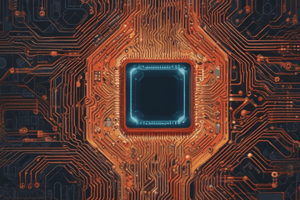Podcast
Questions and Answers
What can be found on the motherboard of a computer?
What can be found on the motherboard of a computer?
- CPU (correct)
- Power supply
- Monitor
- Hard drive
How do CPU makers typically name their microprocessors?
How do CPU makers typically name their microprocessors?
- Using a series of random numbers
- Using a combination of letters and symbols
- Using a make and a model (correct)
- Using only a single name
What is the purpose of the heat sink and fan assembly on a CPU?
What is the purpose of the heat sink and fan assembly on a CPU?
- To increase processing speed
- To add more storage
- To cool the CPU (correct)
- To reduce noise level
What is the primary function of the CPU?
What is the primary function of the CPU?
What type of device can have a CPU?
What type of device can have a CPU?
What is the main focus of this chapter?
What is the main focus of this chapter?
What is a characteristic of SSD (Solid-state drive)?
What is a characteristic of SSD (Solid-state drive)?
What is the purpose of SSD caching in a Hybrid drive (SSHD)?
What is the purpose of SSD caching in a Hybrid drive (SSHD)?
What is a characteristic of a laptop's memory?
What is a characteristic of a laptop's memory?
What is an Optical drive typically used for?
What is an Optical drive typically used for?
What is a characteristic of a Smart card reader?
What is a characteristic of a Smart card reader?
What is true about some laptop video cards?
What is true about some laptop video cards?
Flashcards are hidden until you start studying
Study Notes
The CPU: Brain of the Computer
- A CPU (Central Processing Unit) is a single silicon-based electronic chip that enables a computer to function.
- The CPU is also referred to as a microprocessor.
- CPUs are found in various devices, including desktop computers, laptops, smartphones, smartwatches, and even appliances like washing machines.
CPU Structure and Components
- The CPU is typically located on the motherboard, hidden beneath a heat sink and often a fan assembly.
- CPU manufacturers assign names to their microprocessors, similar to the automobile industry, including make and model (e.g., Intel Core i9, Qualcomm Snapdragon 8 Gen 1, or AMD Ryzen 7).
Overview of the Chapter
- The chapter explores microprocessors in detail, covering their inner workings, components, and interactions with the rest of the computer.
- The chapter is divided into five sections: how processors work, CPU-memory interactions, modern CPUs, selecting and installing CPUs, and troubleshooting CPUs.
SSD (Solid-state Drive)
- A type of storage that uses all memory and has no moving parts
- Characteristics: silent, fast access time, and less latency
- Available in 2.5 inch and 1.8 inch form factors
Hybrid Drive (SSHD)
- A type of storage that combines flash memory and hard drive storage
- SSD caches the hard drive data
- Uses a magnetic disk with traditional spinning drive platters
Replacing Laptop Storage
- A relatively modular process
- Typically involves removing two screws and sliding the drive out
- All internal components are accessible by opening a cover on the back or the entire laptop
Laptop Memory
- Uses SO-DIMM (Small Outline Dual In-line Memory Module) or Micro-DIMM (Micro-Dual In-line Memory Module)
- Specifically designed for laptops and mobile devices
Smart Card Reader
- An integrated card reader built into the laptop
- Can also be an external reader connected via USB
Optical Drive
- Not commonly used in portable devices due to size constraints
- Becoming less common in modern laptops
- Often removable and can be replaced with other media
- Capable of reading and writing CD-RW/CD-ROM and DVD-RW/DVD-ROM
Video Cards
- Often built into the processor and not upgradable
- Sometimes part of the system board and not upgradable
- Some laptops have upgradable video cards, but not the slimline models
Studying That Suits You
Use AI to generate personalized quizzes and flashcards to suit your learning preferences.




